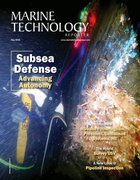Dalhousie University: Quiet Oceans Speak Volumes During Lockdown
Celia Konowe
Research at Dalhousie University shows that a quieter ocean—courtesy of the current COVID-19 pandemic lockdown—can benefit marine life, particularly those listed on the endangered species list, like killer whales.
David Barclay, an assistant professor in the Department of Oceanography, and researchers in his lab took advantage of the current lockdown to explore how the underwater soundscape has changed during the pandemic. Oceans Network Canada, a University of Victoria initiative that operates ocean observatories in the northeast Pacific Ocean and the Salish Sea, provided hydrophones that allowed Barclay and his team to analyse the noise environment of British Columbia’s coastal waters.
The paper, recently accepted for publication in the Journal of the Acoustical Society of America, reported measurable reductions in low-frequency sounds near major shipping routes between Canada and the U.S. Between January and April of this year, a hydrophone west of Vancouver Island recorded a 16% (1.5 decibels) decrease in noise power compared to the same time last year. And, in the usually busy Strait of Georgia, Barclay noticed that not only is the ocean getting quieter, but at a faster rate, too.
The full effects of a quieter ocean are unknown, but they may lead to healthier marine mammal populations. “Free from the distraction and stress we cause, hunting would become easier, mating more convenient, and wayfinding more obvious. Sound is for some whales and marine mammals what sight is for humans,” Dr. Barclay emphasizes.
PhD student and Royal Canadian Air Force Major Dugald Thomson points out that observing the ocean soundscape during “this unique time may provide opportunities to better understand the impact human activity is having on the ocean.” By analyzing this data over the entirety of the pandemic, Barclay adds, scientists can begin to understand “what exactly happens when we turn down the noise in the marine environment.”


 December 2025
December 2025



